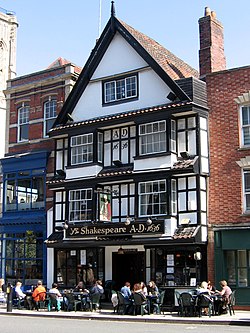| Shakespeare Inn | |
|---|---|
 | |
| General information | |
| Town or city | Bristol |
| Country | England |
| Coordinates | 51°27′06″N2°35′15″W / 51.451620°N 2.587506°W |
| Completed | 17th century |
Shakespeare Inn is a 17th-century pub on Victoria Street, in Bristol, England. It is a timber-framed house, dated 1636 on the front, which was extensively restored in 1950, under the direction of F. L. Hannam, [1] and re-roofed in 1992. It has been designated by English Heritage as a grade II listed building. [2]
